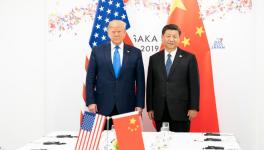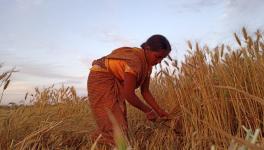The ‘Third Way’ in the IP Fight for COVID-19 Vaccine Rights

Image Courtesy: Business Standard
A scheduled meeting of the Trade Related Aspects of Intellectual Property Rights (TRIPS) Council on March 10 once again discussed the TRIPS waiver proposal and concluded without making much headway. The next formal meeting of the TRIPS Council will now be held on June 8 and June 9, 2021, with dedicated sessions on April 15 and 22 to consider the TRIPS waiver proposal.
Over the past few weeks the World Trade Organisation (WTO) office has been abuzz with activity. As negotiations regarding the TRIPS waiver proposal mooted by India and South Africa continue, the new WTO DG, Ngozi Okonjo-Iweala, took charge on March 1. She appealed to the WTO delegates that “… we ‘walk and chew gum’ by also focusing on the immediate needs of dozens of poor countries that have yet to vaccinate a single person.”
In her speech she cited the requirement of ten billion doses of COVID-19 vaccines as against 3.5 billion doses. She stated that “we must focus on working with companies to open up and license more viable manufacturing sites now in emerging markets and developing countries.” The WTO DG has been calling for a “Third Way” to resolve the issue while negotiations on the TRIPS waiver proposal proceed in parallel. This Third Way, according to murmurs in the WTO circles, may as well be an attempt at diverting the focus from the TRIPS waiver proposal, or rather at undermining those negotiations.
What is the Third Way?
The Third Way that the DG-WTO speaks of is facilitating “technology transfer within the framework of multilateral rules, so as to encourage research and innovation while at the same time allowing licensing agreements that help scale up manufacturing of medical products”.
Voluntary licences are voluntary agreements reached between the patent holder (licensor) and the licensee, the terms and conditions of which are agreed between the patent holder and the licensee; it can specify in which countries a medicine can be sold and what the royalty will be. As some experts say, the “licensing agreements to help scale-up the manufacturing of medical products are narrow, secretive, and voluntary in nature… not designed to deal with a global medical emergency caused by the COVID-19 pandemic.”
During the current pandemic the licensing agreements that pharma companies have entered into have been completely opaque and secretive. Despite COVID-19 being a global public health emergency and the fact that a substantial amount of public money has gone into the research and development of these vaccines, the deals have not been made public. Such practices continue to perpetuate a monopoly of pharma companies in determining the access to vaccines – which country gets it and at what price. Some key concerns with voluntary licensing were raised during the recent WTO negotiations:
• lack of transparency as the terms of the license are usually confidential
• limited geographic scope that even excludes many developing countries from being supplied under the license agreement or allows for manufacturing only for purposes of export
• license is only offered to very specific manufacturers presumably aiming to limit supply
• restrictive terms on the source and production of active pharmaceutical ingredients (APIs)
Incidentally, the supposed alternate approach offered by the WTO DG offers nothing that changes the way the multilateral system has been functioning till date – it is business as usual. Since the 1960s any concrete mechanism for transfer of technology to developing and less developed countries has always been avoided by the developed countries, despite a number of efforts to bring the issue to the table. And, as explained by experts, technology transfer requires not just successful licensing of proprietary technology, but also on such terms that the recipients of technology – developing and less developed countries – can afford.
There has been ample evidence generated by studies which have documented various challenges encountered by developing countries in acquiring access to technology on fair and reasonable terms. These include high royalty payments and charges for technical services, restrictive practices and, in some instances, abuses of patent monopolies, which impose heavy indirect or “hidden” costs through overcharging for imported inputs. Although the WTO DG has hailed some pharma companies (such as AstraZeneca) which have shared the technical knowhow (such as with the Serum Institute of India), most of these deals are secretive, with no information in public on terms and conditions, and work to perpetuate the monopoly power.
Technology Transfer – A Six Decade Long Struggle
It was in 1961 that the United Nations General Assembly adopted a resolution which recognised that “access to knowledge and experience in the field of applied science and technology is essential to accelerate the economic development of under-developed countries”.
Since then a number of such calls and recommendations were put forth in the multilateral arena, but little progress was made. In 1985, a comprehensive Draft Code was put forward to be discussed and negotiated. However, soon there was a standstill in negotiations between developing and developed countries. Among other issues it centred on the approach towards dealing with the treatment of restrictive practices in the transfer of technology transactions. Developing countries demanded that technology transfer be treated as an instrument to meet their development imperatives while developed countries argued that restrictive practices in technology transfer should solely be determined on the basis of abuse of a dominant position of market power within the relevant market.
As Biswajit Dhar points out, after 1985 “the standstill in the Code negotiations almost coincides with the commencement of the Uruguay Round negotiations under the General Agreement on Tariffs and Trade (GATT)” and “the focus on “technology transfer” in the UNCTAD gave way to the agenda for strengthening the regime for the protection of IPRs, culminating in the Agreement on TRIPS laying down the rules.”
The TRIPS Waiver Proposal
The TRIPS waiver proposal seeks to ensure equitable access to affordable vaccines and other medical products and technologies during course of the pandemic until most of the global population is vaccinated and the majority of the world’s population has developed immunity.
In the unprecedented time of a global pandemic, when there is a huge demand and supply gap in the availability of vaccines and shortages of raw materials and other medical equipment to deal with the pandemic across the globe, and where there is unequal access to these across countries, India and South Africa mooted the TRIPS waiver proposal in October 2020. The proposal calls for unhindered global sharing of technology and know-how, demanding a temporary waiver of certain TRIPS obligations on copyrights and related rights, industrial designs, patents, and the protection of undisclosed information in relation to the prevention, containment or treatment of COVID-19. At present, 57 developing and least-developed countries (LDCs) have co-sponsored the waiver proposal, and 62 countries have strongly supported the waiver proposal.
The WTO Agreement on TRIPS is a multilateral trade agreement formalised in 1994. It set minimum standards for intellectual property (IP) protection. In order to mitigate the adverse impact of patents – high prices, monopoly power to pharmaceutical companies, unequal access to medicines and medical products – in 2001 TRIPS flexibilities were negotiated as policy spaces for countries and formalised under the Doha Declaration on TRIPS and Public Health.
At the ongoing WTO negotiations on the TRIPS waiver proposal the developed countries have consistently refused to acknowledge that patents have been a hindrance in making the COVID-19 vaccines and other medical products available to all countries and insist that “only the IP system in place provides the necessary incentives for cooperation between vaccine developers and manufacturers and enables assistance, as well as technology and know-how transfer.” (Switzerland).
This is despite the fact, as also highlighted by the WTO DG Okonjo-Iweala and the WHO DG Dr. Tedros Adhanom Ghebreyesus, that out of vaccine doses administered so far, “the vast majority have been in a handful of rich and vaccine-producing countries” and that due to scarcity of COVID-19 vaccine supplies “around 75 countries are able to move ahead with vaccination while 115 countries wait as people die”.
No production capacities in developing countries?
In order to subvert the TRIPS waiver proposal, and avoid any talk of open technology transfer, the developed countries have insisted that developing countries lack the capacity to produce vaccines or to ramp up production. However, in their submissions the proponents of the waiver proposal have indicated that there are underutilised vaccine manufacturing capacities across the globe and that “according to the WHO out of a 154 pre-qualified vaccines under the WHO’s PQ program, 72 vaccines are produced by vaccine manufacturers in the developing World. These vaccines are originating from various developing country manufacturers, including not only India and China, but also Cuba, Thailand, Senegal and Indonesia.”
Use of Flexibilities?
Alluding to the provision of compulsory licensing, the developed countries have asserted that TRIPS Agreement provides with the tools and policies for member states to take measures to protect public health. However, it has been known that developing countries face institutional and legal difficulties when using these TRIPS flexibilities, and in countries with insufficient or no manufacturing capacity, a cumbersome and lengthy process for the import and export of pharmaceutical products. Experts also opine that the TRIPS flexibilities, including compulsory licences and parallel imports, are riddled with complex, time-consuming processes.
As pointed out by South Africa in the on-going negotiations, “whenever such flexibilities are invoked, political and other sanctions are used to counter such efforts”. A number of countries, such as Chile, Indonesia, Hungary, Russia, have been criticised for their use of compulsory license and emergency regulations during the COVID-19 pandemic.
In its submission at the TRIPS Council meeting on March 10, South Africa noted that “lifting IP monopolies will give governments and manufacturers full freedom to operate and allow collaboration for the development, production and supply of COVID-19 medical products including therapeutics and vaccines, without being restricted by big corporation’s ‘voluntary’ willingness.”
And as rightly put by the WHO DG: “If not now, when?”
Get the latest reports & analysis with people's perspective on Protests, movements & deep analytical videos, discussions of the current affairs in your Telegram app. Subscribe to NewsClick's Telegram channel & get Real-Time updates on stories, as they get published on our website.
























